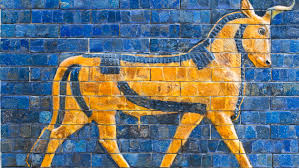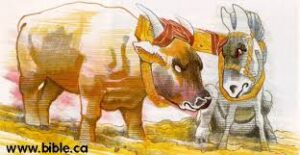Warning Against Idolatry
7: 1-6
Warning against idolatry DIG: Why weren’t the Israelites to worry about the combined military strength of the various peoples of Canaan? What did Ha’Shem mean when He said to utterly destroy them? Which of these commands make you uncomfortable? Can this be reconciled with the picture of God as merciful? What happened to Achan? Why didn’t the Israelites obey Ha’Shem regarding His demands about them? What happened to them? What were the Israelites supposed to do with the many altars and idols they found in Canaan? What was the historical result of all her disobedience?
REFLECT: What in these verses tells you that sin is not a small matter to Ha’Shem? Can a holy God ignore such blatant disregard for His commandments? What eventually happens when we keep disobeying the clear instructions of Ha’Shem? When Ha’Shem told Isra’el to utterly destroy the inhabitants of the Promised Land, does that seem unusually cruel to you? Why? Why not? Who are those in the world today that God doesn’t want you to be unequally yoked with? Are you intermarrying with them? Are you handing your children over to them? In what sense can you destroy them? What will happen if you don’t?
After dispossessing of the various peoples of Canaan, the children of Isra’el were to avoid any friendly relationships with them; instead, they are to utterly destroy them and their idolatrous objects of worship, for YHVH has made Isra’el His special possession.

Utterly destroy them (7:1-2a): When ADONAI your God brings you into the land you are entering to possess and drives out many nations before you – the Hittites and the Girgashites and the Amorites, the Canaanites and the Perizzites, the Hivites and the Jebusites (7:1a).
The center of the Hittite empire (1800-1200 BC) was located in Asia Minor. It is unclear whether the Hittites mentioned here are directly related to that empire or migrated there much earlier and share a common ancestor. The Girgashites are mentioned several times in the TaNaKh (Genesis 10:16, 15:21; Deuteronomy 7:1; Joshua 3:10, 24:11; Nehemiah 9:8; First Chronicles 1:14). They seem to be mentioned in Egyptian texts as allies of the Hittites. The Perizzites (Genesis 13:7, 34:30; Joshua 3:10, 7:1; Judges 1:4-5), seem to have lived in unwalled villages both east and west of the Jordan River.216 Although the Amorites and the Canaanites originated from different places (the Amorites being originally from the upper Euphrates region and having migrated to Canaan in the late third millennium, the Canaanites being the descendants of Ham and indigenous to Canaan), it appears that the Amorites generally occupied the hill country, while the Canaanites inhabited the coastal and lowland regions. The Hivites, or Horites lived in various parts of Canaan and Lebanon (Genesis 14:6, 36:20-22, 29-30; Numbers 13:5; Deuteronomy 2:12 and 22), and are associated with Shechem (Genesis 34:2), Gibeon (Joshua 9:7, 11:19), and Mount Hermon (Joshua 11:3). The Jebusites were descendents of Ham through Canaan (Genesis 10:16) and occupied the hill country of Canaan (Numbers 13:29; Joshua 11:3). Named after the city of Jebus, which remained in their hands until David conquered it and renamed it Jerusalem (see the commentary on the Life of David, to see link click Co – David Conquers Yerushalayim). As a group those seven nations were more numerous and mightier than Isra’el (7:1b). Various listings of nations occur twenty-seven times in the TaNaKh, with the number of nations ranging from two to twelve. Therefore, it is likely that seven reflects the number of completeness.217
The strength and numbers of the enemy, however, were not to be cause for alarm for the Israelites, for the God of the covenant would grant His chosen people the strength to be victorious. ADONAI your God gives them over to you and you are to strike them down, then you are to utterly destroy them (7:2a). This is the concept of the cherem judgment, which means to be devoted to destruction. Even though Jericho was devoted to destruction, when Achan took a beautiful robe from Shin’ar, five pounds of sliver shekels and one-and-a-quarter-pound wedge of gold (Joshua 7:21), he became devoted to destruction. As a result, Joshua, together with all Isra’el, took Achan, with the sliver, the robe, the gold wedge, his wife, his sons, his daughters, his cattle, his donkeys, his sheep, his tent, and everything he had, and brought them up to the Achor Valley . . . then all Isra’el stoned him to death and burned them to ashes. Over him they piled a great mound of stones. Finally, ADONAI turned away from His fierce anger (Joshua 7:24-26a). Those seven nations who occupied the Land promised to Isra’el were to be utterly destroyed, which means they were devoted to destruction, and were to be dealt with just like Achan was dealt with. The Israelites were supposed to deal with them like they had done when they defeated Og earlier. They captured all his cities and killed everyone who was devoted to destruction – men, women and children. They left no survivors (2:34). Little Canaanites would grow up to be big Canaanites (see Ag – The Problem of Holy War in the TaNaKh).
Dear Heavenly Father, You are holy and You cannot live with sin. It is Your love that said, “Destroy the evil Canaanites.” It is your love that says, “Do not be unequally yoked.” Praise You for You are wise in what You permit and what You say no to. For Adonai Elohim is a sun and a shield. ADONAI gives grace and glory. No good thing will He withhold from those who walk uprightly (Psalms 84:12). Praise You that You always want what is the very best for Your children. When we run to You asking Your guidance, we can trust that there is nothing better for us. Your no is a wise and kind no and Your yes is spoken with Your arm outstretched to help us. For God Himself has said, “I will never leave you or forsake you,” so that with confidence we say, “The Lord is my helper; I will not fear. (Hebrews 13:5c-6a). We love worshiping You, obeying You and look forward to praising You all day long in Your wonderful heavenly home of eternal peace and joy! In Yeshua’s holy name and power of His resurrection. Amen
Unfortunately, Isra’el did not follow the LORD’s instructions, and did not utterly destroy the inhabitants of the Promised Land. And just like King Sha’ul, who failed to strike down Amalek and utterly destroy all he had because the Amalekites were devoted to destruction (First Samuel 15:1-35), it eventually led to spiritual adultery and discipline from Ha’Shem (see the commentary on Hebrews Cz – God Disciplines His Children). Isra’el is God’s chosen people and treasured possession, and their separation from idolatry in Canaan was important to the nation’s spiritual health and political future.218

Do not be unequally yoked (7:2b-7:5): You are to make no covenant with them because that would be disobeying God’s demand to devote them to destruction and show no mercy to them (7:2b). Why? Because of the wickedness of those nations (Deuteronomy 9:4). Sin has its limit, and sin needs to be punished. This suspicion of disloyalty to YHVH remained a potent theme in the later interaction between prophets and those kings of Judah and Isra’el who joined in the alliance-hunting policies of the ancient Near East international power games.219 But we know from history that the Israelites did not utterly destroy those nations, and in the end, Isra’el ended up following them. That decision has haunted the Jews until today.
YHVH wanted to protect the young nation from being influenced by their godless neighbors. Intermarriage was a potent factor in the mixing of cultures and religions in Isra’el’s world. So, ADONAI said: You are not to intermarry with them – you are not to give your daughter to his heathen son, or take his heathen daughter for your son. For he will bring up your grandson and turn him away from following Me to serve other gods. Then the anger of ADONAI will be kindled against you, and He will swiftly destroy you (7:3-4).
Notice the progression of these verses. First, they were told to utterly destroy the pagans (7:1-2a). But ADONAI knew that the Jews would fail to follow His command. So, next, the Ruach ha-Kodesh inspired Moses to tell them not to make a covenant with them (7:2b). Knowing that violate that command, God told them not to intermarry with them (7:3). Which, of course, they did. The result was that the anger of ADONAI was kindled against them, and they were destroyed, first by the Babylonians and taken into captivity (see the commentary on Jeremiah Gu – Seventy Years of Imperial Babylonian Rule), and then by the Romans and scattered among the nations.
Instead, you are to deal with them like this: tear down their altars, smash their standing stone pillars, cut down their Asherah poles, which represented the goddess Asherah, and stood at Canaanite places of worship (Exodus 34:13) alongside the altar of Ba’al (Judges 6:25 and 28), and burn their carved images with fire (7:5). The poly-theism of many altars and idols cannot coexist with the God of the Sh’ma (see Bw – Sh’ma Isra’el).220 By doing this, it would remove any temptation of the Isrealites to follow the religious practices of the nations that they were to utterly destroy.
For God has chosen you (7:6): The actions that YHVH demanded up to this point were intended to protect Isra’el’s distinctiveness. However, even knowing that the Israelites would ultimately fail to follow His commands, nevertheless, ADONAI did not abandon them. For you are a holy people to ADONAI your God. Basically, holiness is an attribute of Ha’Shem that sets Him apart from everything else in creation. As a result, the holiness of Isra’el in Deuteronomy is always explained in terms of YHVH’s haven chosen them as His own people from all the peoples on the face of the earth, ADONAI your God has chosen you to be His treasured people (see Bf – God’s Chosen People). This is one of the clearest statements in Deuteronomy of Isra’el’s election (7:6).



Leave A Comment